For those who are new to the world of saltwater aquariums, one of the most common questions that arises is whether tap water can be used. While it may seem like a simple question, the answer is not as straightforward as one might think. The use of tap water in a saltwater aquarium can have both benefits and drawbacks, and it ultimately depends on a variety of factors.
On one hand, tap water is readily available and easy to obtain, making it a convenient option for many aquarium owners. However, tap water can contain a variety of chemicals and contaminants that can be harmful to the delicate ecosystem of a saltwater aquarium. These chemicals can include chlorine, chloramine, and nitrates, among others. As a result, using tap water may require additional steps to ensure that it is safe for marine life.
Ultimately, the decision of whether to use tap water in a saltwater aquarium will depend on a number of factors, including the quality of the tap water in your area, the type of marine life in your aquarium, and your personal preferences as an aquarium owner. In this article, we will explore some of the pros and cons of using tap water in a saltwater aquarium, as well as some tips for ensuring that your tap water is safe for your marine life.
Understanding Saltwater Aquariums
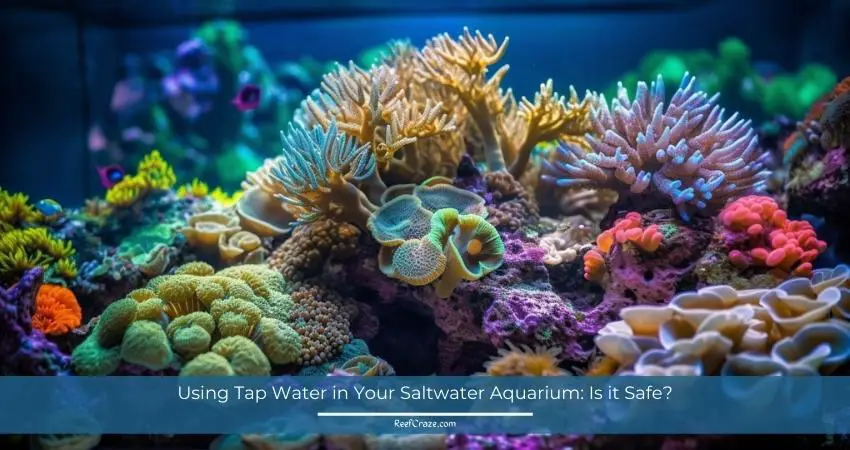
What is a Saltwater Aquarium?
A saltwater aquarium is a tank that contains saltwater and marine organisms such as fish, corals, and invertebrates. These aquariums are designed to mimic the natural environment of the ocean and require careful maintenance to ensure that the water quality remains optimal for the inhabitants.
Read More: Reef Tank Vs. Saltwater tank
Why is Water Quality Important?
Water quality is crucial for the health and survival of the marine organisms in a saltwater aquarium. Poor water quality can lead to stress, disease, and even death. In addition, many marine organisms require specific water parameters to thrive, such as a stable pH, appropriate salinity levels, and the right amount of calcium and magnesium.
When it comes to using tap water in a saltwater aquarium, there are some factors to consider. Tap water may contain chlorine, chloramines, heavy metals, and other contaminants that can be harmful to marine organisms.
However, some aquarists do use tap water after treating it with a dechlorinator or other water conditioner. In addition to water quality, lighting, temperature, and filtration are other important factors to consider when setting up and maintaining a saltwater aquarium. Proper research and education are essential for success in this hobby.
Tap Water vs. Saltwater
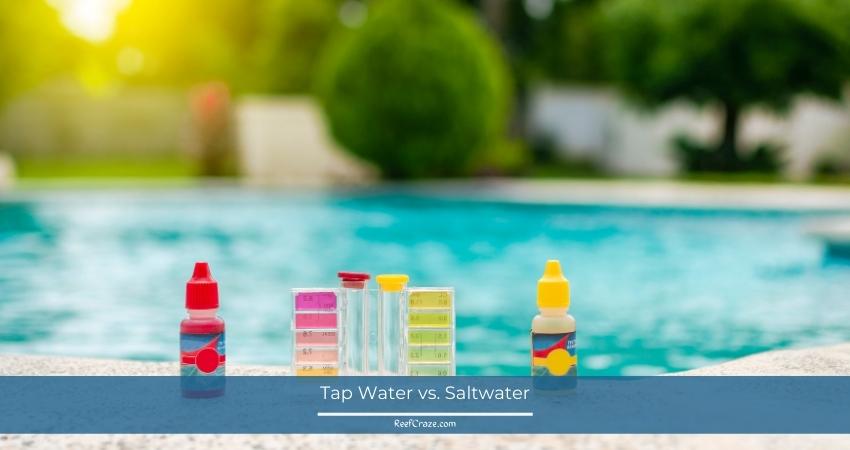
Differences Between Tap Water and Saltwater
Tap water and saltwater are two vastly different types of water. Tap water is treated water that has gone through a purification process to make it safe for human consumption. It typically contains high levels of chlorine, which is used to disinfect the water. Saltwater, on the other hand, is water that contains a high concentration of salt and minerals. It is the natural habitat of marine life.
One of the main differences between tap water and saltwater is their salinity levels. Tap water has a very low salinity level, while saltwater has a high salinity level. This makes it challenging to use tap water in a saltwater aquarium, as it can disrupt the delicate balance of the ecosystem.
Challenges of Using Tap Water in a Saltwater Aquarium
Using tap water in a saltwater aquarium can present several challenges. One of the main challenges is the presence of chlorine in tap water. Chlorine can be harmful to marine life, especially in high concentrations. It can damage the gills of fish, making it difficult for them to breathe. It can also kill beneficial bacteria in the aquarium, which are essential for maintaining a healthy ecosystem.
Another challenge of using tap water in a saltwater aquarium is the presence of impurities and chemicals. Even though tap water goes through a purification process, it can still contain impurities and chemicals that can be harmful to marine life. These impurities and chemicals can cause a variety of problems, such as algae blooms, fish diseases, and coral bleaching.
Overall, it is not recommended to use tap water in a saltwater aquarium. It is best to use reverse osmosis (RO) water or distilled water, which have a low salinity level and are free from impurities and chemicals. This will help maintain a healthy and balanced ecosystem in the aquarium.
Testing Your Tap Water
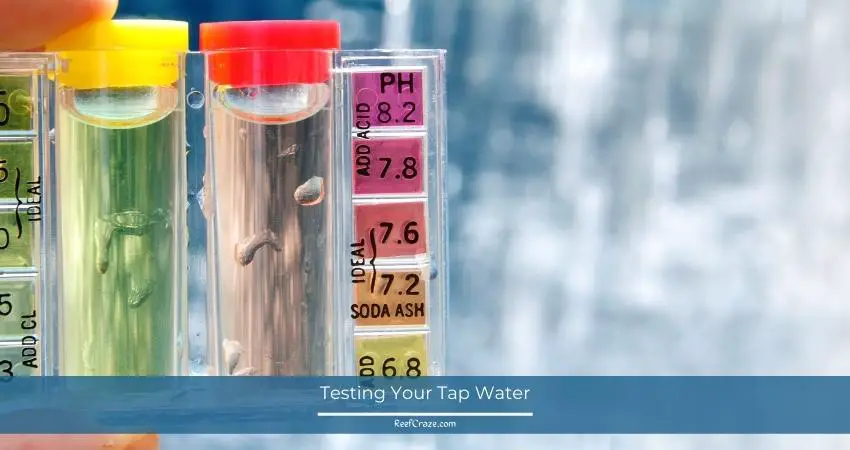
Why Test Your Tap Water?
Before adding tap water to your saltwater aquarium, it is important to know what is in it. Tap water varies from one location to another, and the composition of your local water can have a significant impact on the health of your fish and corals. Testing your tap water can help you identify any potential issues and take steps to address them before adding the water to your aquarium.
How to Test Your Tap Water
Testing your tap water is a simple process that can be done at home with a test kit. Many kits are available for do-it-yourself tap testing, but it’s important to choose a reliable and accurate kit. The EPA recommends using a certified lab, but if you prefer to test your water at home, look for a kit that tests for the following parameters:
- pH
- Chlorine
- Ammonia
- Nitrite
- Nitrate
- Hardness
- Alkalinity
To test your tap water, follow the instructions provided with your test kit. Typically, you will need to collect a sample of your tap water and add reagents to the sample. The reagents will change color based on the levels of various parameters in your water, allowing you to determine whether your water is safe for your saltwater aquarium.
It’s important to note that tap water may contain high levels of chlorine, chloramines, and other compounds that can be harmful to your fish and corals. If your tap water contains these compounds, you may need to use a water conditioner or a reverse osmosis/deionization (RO/DI) unit to remove them before adding the water to your aquarium.
Treating Tap Water for a Saltwater Aquarium
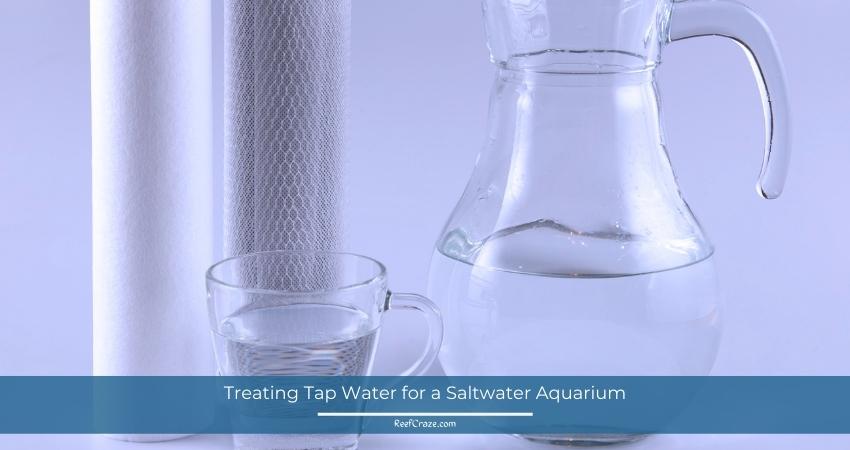
Water Conditioners:
Water conditioners are a popular choice for treating tap water for a saltwater aquarium. These products remove harmful chemicals from tap water, such as chlorine and chloramines, which can be toxic to fish and other aquatic life. Water conditioners work by binding with these chemicals and rendering them harmless.
One downside of using water conditioners is that they do not remove other harmful compounds, such as heavy metals, nitrates, and phosphates. These compounds can build up over time and cause problems in the aquarium. Therefore, it’s important to monitor the water quality regularly and perform regular water changes to maintain a healthy environment for your aquatic life.
Reverse Osmosis (RO) Water:
Reverse osmosis (RO) water is another option for treating tap water for a saltwater aquarium. This process involves filtering tap water through a semi-permeable membrane to remove impurities and contaminants. The resulting water is pure and free of harmful chemicals and compounds.
One downside of using RO water is that it can be expensive and time-consuming to produce. Additionally, RO water lacks essential minerals that are beneficial for aquatic life, so it may be necessary to add supplements to the water to maintain a healthy balance.
Dechlorinators:
Dechlorinators are another option for treating tap water for a saltwater aquarium. These products neutralize chlorine and chloramines in tap water, making it safe for aquatic life.
One downside of using dechlorinators is that they do not remove other harmful compounds, such as heavy metals, nitrates, and phosphates. Additionally, some dechlorinators can cause a temporary drop in pH levels, which can be stressful for aquatic life.
Overall, the best option for treating tap water for a saltwater aquarium will depend on your individual needs and preferences. It’s important to research and compare different products to find the one that works best for you and your aquatic life.
Can I use Distilled Water in my Saltwater Aquarium?
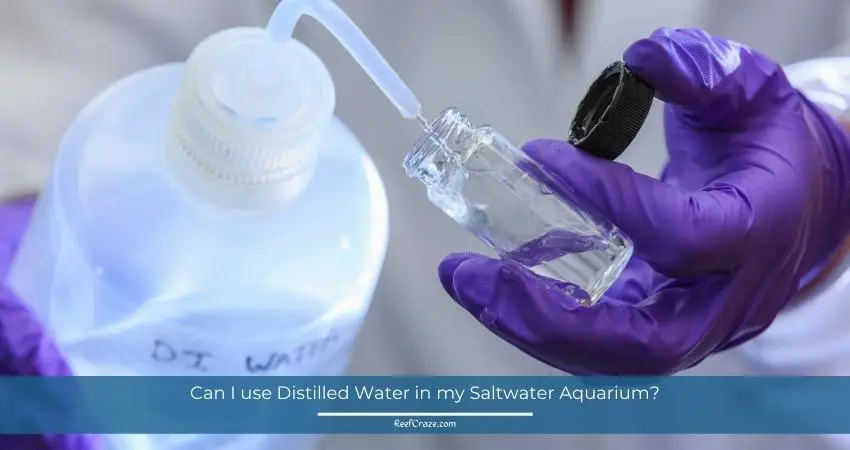
Distilled water is a type of purified water that has gone through a process of distillation to remove impurities and minerals. While it may seem like a good choice for a saltwater aquarium, it is not recommended to use untreated distilled water in a saltwater fish tank.
Saltwater fish require precise and stable water parameters to stay healthy, and distilled water lacks the minerals and nutrients needed to maintain these levels. However, many saltwater fish tank-keepers use distilled water for top-offs as well as to perform entire water changes. The main difference for saltwater fish tanks is that only freshwater is added during top-offs while in water changes, water needs to be mixed with salt to match salinities.
The best way to use distilled water is to mix it with minerals. This remineralized distilled water is among the top choices for saltwater aquariums because it is no longer harmful to your fish. Not only will your aquarium be pollution-free but also include the minerals essential for your fish’s very survival.
RO/DI is not distilled water, but they are similar quality, just treated with a different process. Either is a good choice but if you have to purchase water Distilled is usually easier to find than RO/DI.
Parting Words
After researching and considering the information provided, it is clear that tap water can be used in a saltwater aquarium. However, it is important to take certain precautions and steps to ensure the safety and health of your aquatic creatures.
Using a conditioner specifically designed for removing both essential chlorine elements and chloramines can help eliminate any unwanted flavors or odors in the tap water. Additionally, investing in a reverse osmosis system can provide a more efficient and effective way of filtering water at home for your saltwater aquarium.
While some aquarists may feel that tap water is not suitable for use in saltwater aquariums due to the presence of chlorine and other chemicals, it is important to note that these chemicals can be removed with the proper treatment methods. It is also important to monitor the quality of the water regularly and make any necessary adjustments to maintain the proper salinity levels and balance of organic nutrients.
Overall, tap water can be made safe for use in a saltwater aquarium with the proper precautions and treatment methods. By following these guidelines and regularly monitoring the quality of the water, you can provide a safe and healthy environment for your aquatic creatures to thrive in.
